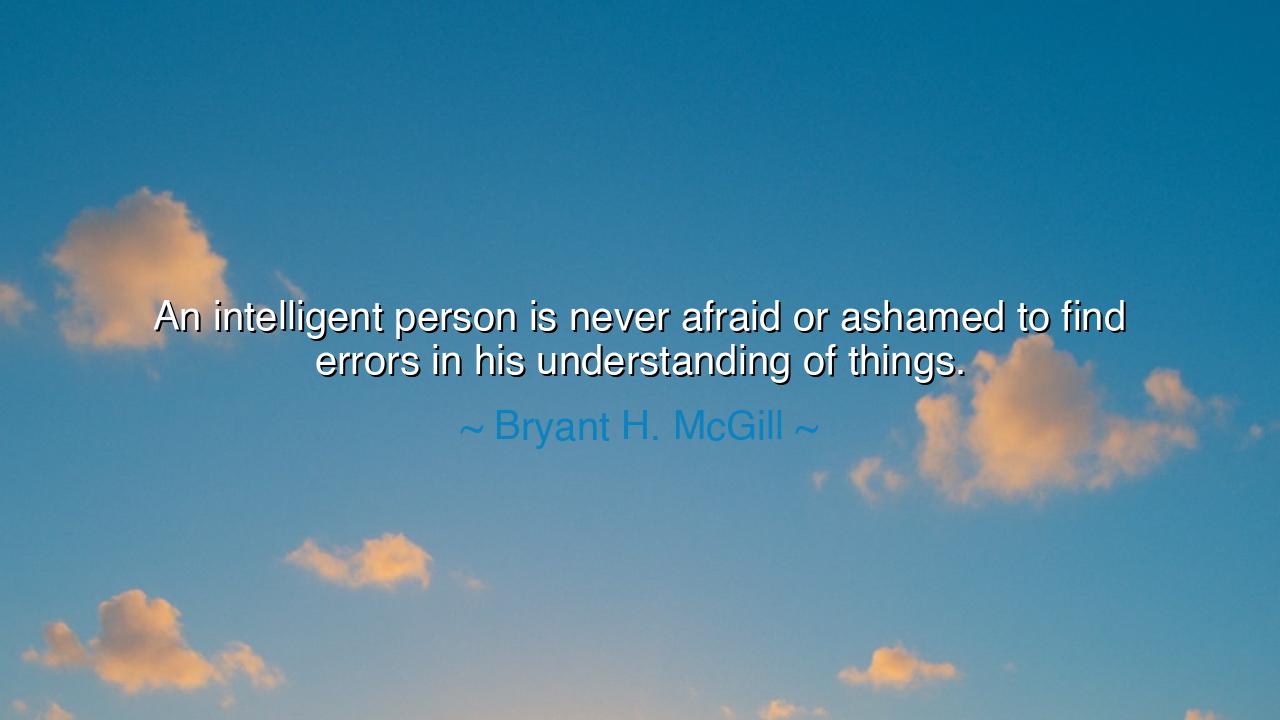
An intelligent person is never afraid or ashamed to find errors
An intelligent person is never afraid or ashamed to find errors in his understanding of things.






In the quiet chamber of reflection, Bryant H. McGill, a seeker of truth and a philosopher of the heart, uttered a wisdom that shines like a mirror before the mind: “An intelligent person is never afraid or ashamed to find errors in his understanding of things.” These words strike at the core of what it means to be truly wise. They remind us that the path of intelligence is not built upon the illusion of perfection, but upon the courage to be wrong — and to learn from it. The fool clings to pride and defends his ignorance as a fortress, but the wise walk freely through the ruins of their old beliefs, unashamed to rebuild anew.
The origin of this truth springs from McGill’s reflections on self-awareness, humility, and personal growth. In an age swollen with information yet starved for understanding, he saw that many confuse knowledge with wisdom. To know much is easy; to see one’s own error is rare. The intelligent person, as McGill defines it, is not the one who always knows, but the one who is always learning. Such a person has learned the sacred art of self-correction — of seeing each mistake not as a failure, but as a doorway to deeper understanding. This humility before truth is not weakness; it is the foundation of all greatness.
To find errors in one’s understanding is to confront the limits of one’s own mind, and this act demands courage. For the ego trembles when it is proven wrong; it fears the humiliation of imperfection. Yet the intelligent soul knows that ignorance exposed is ignorance defeated. It is not shameful to have been mistaken; it is shameful to remain mistaken out of pride. Thus, McGill’s teaching reminds us that wisdom begins where defensiveness ends — where the heart opens itself to correction, and the mind bows before the light of truth.
History bears witness to the power of this humility. Consider Galileo Galilei, who dared to question the accepted order of his time. When he turned his telescope toward the heavens, he discovered that the universe was far larger, far stranger than the scholars and priests of his day imagined. For this, he was condemned. Yet Galileo was not ashamed to admit that even his own earlier beliefs had been mistaken. His intelligence was not in his discoveries alone, but in his willingness to surrender to new evidence. He loved truth more than pride, and though silenced by the world, his mind remained free. His humility before reality changed humanity’s understanding forever.
So it is in all things: the wise do not fear being wrong. The child who learns to walk must fall a thousand times before it stands tall. The artist must fail on countless canvases before one masterpiece is born. The thinker must discard a hundred falsehoods before reaching one lasting truth. In every field, from science to spirit, progress is the child of error — and the parent of wisdom is humility. The one who clings to pride clings to stagnation; the one who embraces correction becomes limitless.
To live this wisdom, one must cultivate a heart that is teachable. When corrected, listen. When proven wrong, thank the truth for finding you. Reflect upon your judgments, your certainties, your long-held assumptions, and dare to ask: Am I still right? The intelligent person does not fear this question; they welcome it. For every time you uncover an error, you are not diminished — you are transformed. The river of wisdom flows only through the valley of humility.
Therefore, my children of thought and reason, remember this eternal lesson: intelligence is not the absence of error, but the openness to correction. Do not measure your worth by how often you are right, but by how quickly you rise when proven wrong. Rejoice when your ignorance is revealed, for that moment marks the death of falsehood and the birth of understanding. Seek not to defend your pride, but to refine your truth.
For as Bryant H. McGill teaches, the mind that fears correction imprisons itself in darkness, but the mind that welcomes it grows radiant like the dawn. Let your pride bow before learning; let your mistakes become your teachers. In this way, you will walk the path of the truly intelligent — one who never stops growing, never stops seeking, and never, ever stops learning.






AAdministratorAdministrator
Welcome, honored guests. Please leave a comment, we will respond soon